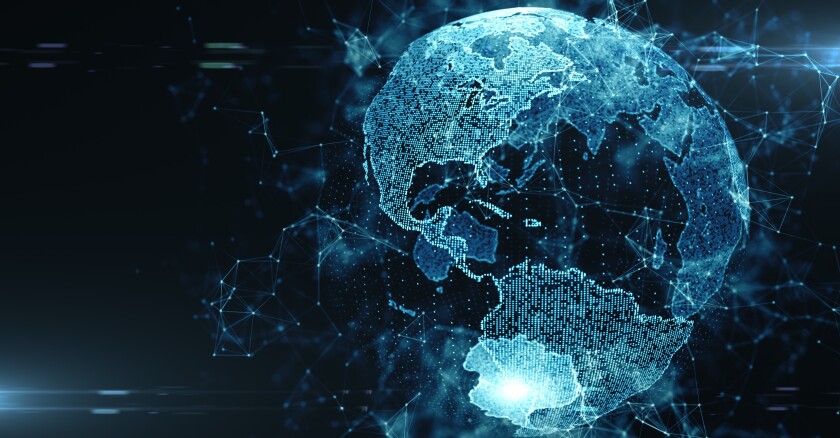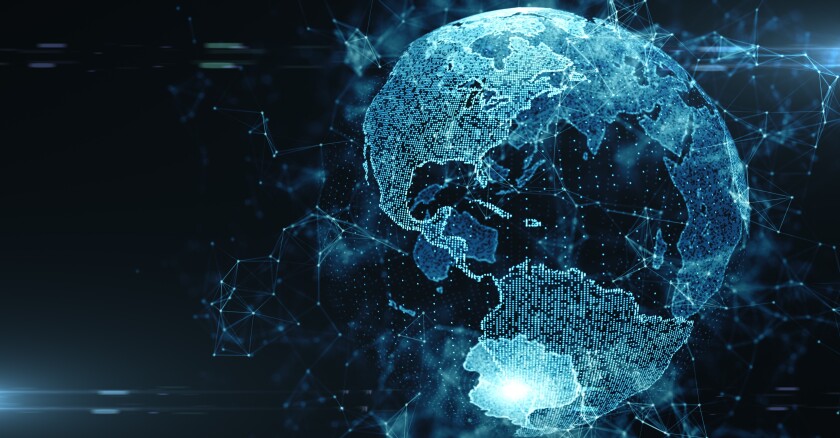The 54th Annual Meeting of The World Economic Forum took place in Davos, Switzerland, this past week, and cybersecurity and AI were again top topics. Here are some highlights.
January 21, 2024 •

Adobe Stock/immimagery
How can we gauge what world leaders in the public and private sectors are currently thinking about cybersecurity and upcoming innovations in technology? One excellent way is to examine the speeches, interviews, media reports and white papers that come out of the World Economic Forum in Davos, Switzerland, each January.
They lead with “AI needs DEI”: “The spectre of a ‘Hal’ — the evil AI character in the movie 2001: A Space Odyssey — hangs heavily over Davos this year, amid fears that artificial intelligence will not only unleash existential risks (i.e., computers outsmarting humans), but concentrate power in a way that increases inequalities. Worse still, as Alex Tsado, co-founder of the nonprofit group Alliance4ai told me, voices outside rich nations have so far been largely excluded from the development and deployment of AI. Alliance4ai, however, is fighting to rectify this in Africa. And while diversity, equity and inclusion (DEI) is out of fashion at some businesses amid a political backlash, Big Tech companies know they need to offset criticism around the biases in AI.”
Second on their list is “Digitisation for good.” At the end of the section they mention this story: “The most memorable tale for me involves aircraft toilets: I was told that the U.S. government is deploying machine learning systems to analyse waste water samples when planes land at airports to scan for new viruses. Think of this when you next fly.”
CYBER UPDATES
As in previous years, The World Economic Forum published a Global Cybersecurity Outlook 2024. This report is issued in conjunction with Accenture.
In the executive summary, they lead with this: “In 2023 the world faced a polarized geopolitical order, multiple armed conflicts, both scepticism and fervour about the implications of future technologies, and global economic uncertainty. Amid this complex landscape, the cybersecurity economy grew exponentially faster than the overall global economy, and outpaced growth in the tech sector. However, many organizations and countries experienced that growth in exceptionally different ways.
“A stark divide between cyber-resilient organizations and those that are struggling has emerged. This clear divergence in cyber equity is exacerbated by the contours of the threat landscape, macroeconomic trends, industry regulation and early adoption of paradigm-shifting technology by some organizations. Other clear barriers, including the rising cost of access to innovative cyber services, tools, skills and expertise, continue to influence the ability of the global ecosystem to build a more secure cyberspace in the face of myriad transitions.
“These factors are also ever-present in the accelerated disappearance of a healthy “middle grouping” of organizations (i.e., those that maintain minimum standards of cyber resilience only).”
Their main points include (with percentages and details in the report link):
- There is growing cyber inequity between organizations that are cyber resilient and those that are not.
- Emerging technology will exacerbate long-standing challenges related to cyber resilience.
- The cyber skills and talent shortage continues to widen at an alarming rate.
- Alignment between cyber and business is becoming more common.
- Cyber ecosystem risk is becoming more problematic.
Watch this interview from Cisco CEO Chuck Robbins, who sees opportunities in AI and cybersecurity:
Another big theme was building trust. This website has trust quotes from top leaders. Here are a few:
Antonio Guterres: “When global norms collapse, so does trust. I am personally shocked by the systematic undermining of principles and standards we used to take for granted. I am outraged that so many countries and companies are pursuing their own narrow interests without any consideration for our shared future or the common good.”
Professor Klaus Schwab: “Open, transparent conversations can restore mutual trust between individuals and nations who, out of fear for their own future, prioritize their own interests,” said the founder and Executive Chairman of the World Economic Forum. “The resulting dynamics diminish hope in a brighter future. To steer away from crisis-driven dynamics and foster cooperation, trust and a shared vision for a brighter future, we must create a positive narrative that unlocks the opportunities presented by this historic turning point.”
Jagan Chapagain, the chief executive officer and secretary general of the International Federation of Red Cross and Red Crescent Societies
met with the World Economic content team for a special conversation on his goals and lessons learned: “A lot of the crisis we are facing around the world, the underlying issue has been the lack of trust. And with the technology growing — and of course the AI we are talking about also here — is of course the technology brings a lot of positives, but also if it is not used, it can also contribute in eroding the trust. And that’s where I think it’s extremely, extremely important that the leader’s job is focused on the positive and build or contribute to building the trust.”
I also like this Bloomberg article which highlights how “OpenAI Is Working With US Military on Cybersecurity Tools“:
“OpenAI is working with the Pentagon on a number of projects including cybersecurity capabilities, a departure from the startup’s earlier ban on providing its artificial intelligence to militaries.
“The ChatGPT maker is developing tools with the U.S. Defense Department on open source cybersecurity software — collaborating with DARPA for its AI Cyber Challenge announced last year — and has had initial talks with the U.S. government about methods to assist with preventing veteran suicide, Anna Makanju, the company’s vice president of global affairs, said in an interview at Bloomberg House at the World Economic Forum in Davos on Tuesday.”
FINAL THOUGHTS
A reminder about cybersecurity threats came when Swiss websites hit by DDoS attacks during World Economic Forum in Davos: “Swiss websites were hit by a wave of distributed denial-of-service (DDoS) attacks this week, likely orchestrated by pro-Russian hackers. According to the Swiss National Cybersecurity Centre (NCSC), the attacks temporarily disrupted access to several websites run by the Federal Administration — the government’s executive branch.
“’The cyberattack was promptly detected and the Federal Administration’s specialists took the necessary action to restore access to the websites as quickly as possible,’ said NCSC’s statement.”
I suspect we will be hearing much more on the topics of building cybersecurity, building trust and generative AI regulation in the years ahead.

Daniel J. Lohrmann is an internationally recognized cybersecurity leader, technologist, keynote speaker and author.
*** This is a Security Bloggers Network syndicated blog from Lohrmann on Cybersecurity authored by Lohrmann on Cybersecurity. Read the original post at: https://www.govtech.com/blogs/lohrmann-on-cybersecurity/cybersecurity-challenges-at-the-world-economic-forum
